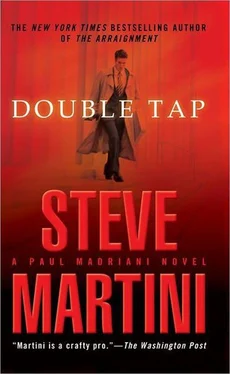At some point, amid the shouting and chaos and with Evo backpedaling up the sidewalk, my uncle tried to pass the officer a twenty-dollar bill. The officer wasn’t sure whether Evo was trying to pay the fine, bribe him, or simply purchase continuing protection against the cyclist.
With the cop in the middle, it must have looked like a comic maypole: a spindly, red-faced cyclist in tights, jumping up and down, shouting, trying to reach around to grab some shirt every few seconds, coming away instead with a few hairs the texture of fence wire from my uncle’s arm. People driving by must have thought the guy was on drugs, chasing someone with ten inches of reach and a hundred pounds on him. If Evo had fallen on the guy, the man’s injuries would have been fatal.
Unable to get his license out, with the cop in the middle and the cyclist pushing them up the street, Evo kept pulling the only thing he could get his fingers on from his wallet: currency from the large open pocket.
With a fistful of bills in his face and an agitated biker climbing up his back, demanding an arrest, the cop did the only thing he could. Evo found himself snagged in the gears of the law, sitting in the county jail, charged with a fix-it ticket for a bad brake light and bribery of a peace officer-a possible four-year stint in the joint, depending on the amount of cash in his hand at any given moment.
It took me an hour to get Evo out of jail with an order signed by a judge. It took me a few more days and a carload of medical records from the VA to convince a supervisor in the DA’s office that he really didn’t want to go to trial, bribery being a crime of specific intent. Evo had full mental disability, certified by the government with shrinks in attendance to testify; he was a man who’d had more voltage passed through his body than most cons strapped to “Old Sparky”; who during periods of his life had difficulty forming the requisite intent to get out of his chair and walk to the kitchen-and when he did, he usually couldn’t remember why he’d started the journey. It was not a case in which to sound the bugle and mount the charge for clean government.
After viewing the size of the box and feeling the weight of the medical records inside, the prosecutor allowed my uncle to fix his brake light and go. And so we did.
But even in death it seems my uncle was ill-fated. My aunt, his sister, was to endure one last losing battle, this one with the VA. I learned years later that my uncle’s military records never properly reflected his first name. At induction, some clerk had typed in the name “Elvo,” instead of “Evo,” so that to this day it is the name “Elvo” that marks his grave. Go online and you can find it-the name Elvo Angelo in the records of the Golden Gate National Cemetery. Like the tomb of the unknown, Evo rests for eternity, under another name.
The experience with my uncle taught me that not all men who die in wars are buried immediately. It also gave me an abiding respect for those who have experienced what most of us have not: the indescribable chaos and horror of battle, and the nightmare memories, images and visions that sear the soul.












